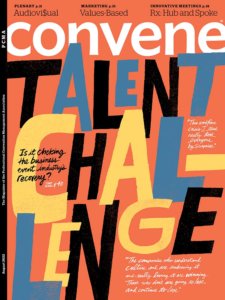
Tracy Judge (left), CEO of Soundings, and freelance eventprof Erika Brunke speak on the benefits of going freelance during a panel session August 5 at CEMA Summit in Seattle. (Whatever Media Group)
According to “Agile Talent Strategies: Leveraging the Expertise of Freelancers in the Business Events Industry,” a new report from Soundings released earlier this month, the trend of event professionals opting for freelance work rather than full-time employment during and immediately after the pandemic is still going strong.
The findings were shared during a panel discussion, “Navigating the Shift: From Corporate to Freelance,” at the 2024 CEMA Summit, which featured Tracy Judge, Soundings founder and CEO, along with event professionals Erika Brunke, Stacey Kashubeck, and Michele Schneider, who left full-time jobs to work as freelancers.
According to Judge, they’ve seen an increase in the number of the people joining Soundings, a talent community of more than 2,900 independent business events professionals. But the report’s insights also echo a wider trend in the U.S. workforce — according to Upwork, 36 percent of workers from all industries chose to work freelance last year, a 22-percent increase from 2019. Soundings collaborated with the Institutional Review Board at Temple University to produce the report. A total of 238 freelance workers in the events industry surveyed in the report cited work-life balance and flexibility as their top reasons for making the change, along with feeling burned out and a desire for more independence.
However, it’s not that freelance eventprofs want to work less, they seem just want more control over their schedule. More than one-third — 36 percent — identify as “active caretakers,” whether it’s for children or family members. And almost 70 percent reported working 40 hours a week or more as freelancers. And their wages haven’t seemed to suffer, either: Nearly half (46 percent) reported earning between $100,000 and $200,000 annually.

Read stories from our August 2022 coverage of “The Talent Challenge.”
The report also notes that this corporate exodus is a continuation of what began with the COVID-19 pandemic, when many workplace shifts were put into motion, from layoffs to changes in priorities. When Convene spoke with Judge for the August 2022 cover story on talent trends and challenges in the events industry, she had already seen a marked increase in the number of meeting planners looking to leave their full-time jobs between 2020 and 2022.
Shortly before CEMA Summit, Convene reached out to Judge again, who responded via email to share what has changed since her last interview, and what new trends are shaping the future of the freelance marketplace.
When I interviewed you in 2022, you said that organizations were looking for “…different roles and skillsets” like “CVENT [experience], technical expertise for virtual events, technical expertise on the production side, planners who have a marketing background because marketing and events have really merged at this point, and anything from a digital-marketing perspective or a data perspective.” Does this still ring true or has this changed?
For the most part, this has stayed true. The top five roles for 2023 and 2024 (year-to-date) based on the total amount of money we paid to talent for these roles are: event technology specialists, event registration specialists, meeting and event planners, event marketing roles, and marketing specialists.
And as for the hardest roles to fill, you said in 2022 that those were the “coordinator-like positions, like registration managers, and entry-level roles,” largely due to a gap in the industry. How has this changed?
We are now seeing fewer requests for junior roles and more requests for senior roles that require specific vertical experience and technology expertise — especially in marketing and project management technologies.
Roles that are too broad can be hard to fill because they require diverse skill sets and opposite strength profiles, making it challenging to find a candidate who fits all aspects of the job. In these cases, we recommend customers split the role into two separate functions to attract the best talent for each.
Roles that require freelancers to go into the office are harder to fill because many freelancers prefer remote work. Additionally, depending on the location, it can be challenging to find the required experience at a price the customer [can pay].
What other trends and changes are you currently seeing in the freelance marketplace?
In response to the growing freelance workforce, increased regulations have been implemented, and governments are focusing more on worker classification compliance. For example, the DOL and IRS have partnered to improve compliance with laws and regulations. This provides better protections and benefits to freelancers, including access to health insurance, retirement plans, and other social benefits, making freelancing a more viable and secure career option. We changed our business model at the end of 2022 to ensure worker classification compliance, and now provide many of these benefits.
More corporations are adopting agile talent models that integrate freelance talent with full-time employees. This approach allows companies to leverage specialized skills for specific projects and provides the flexibility to scale their workforce according to business needs, enhancing overall productivity and innovation.
[Also], there has been a significant increase in requests for staffing, both internationally and locally, in the destination of the event for sustainability and budget reasons. This applies to both pre-planning and on-site roles. Sustainability-related reasons include worker classification compliance, which ensures equitable compensation and a suitable work environment. Freelancing allows individuals to work in a way that suits their life situation while providing for their needs.
In addition, hiring local talent stimulates local economies, protects local cultures, and educates event organizers on fair business practices in the location. Hiring locally also minimizes travel and reduces the carbon footprint of events.
Jennifer N. Dienst is senior editor of Convene.
